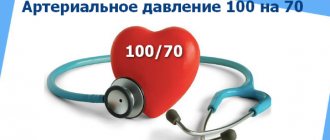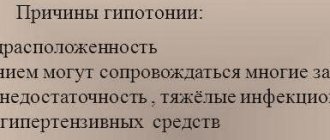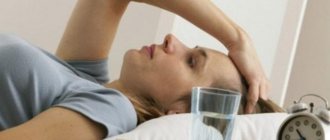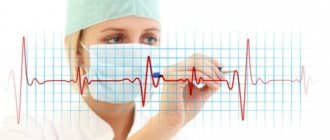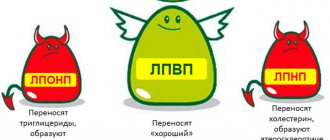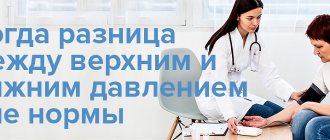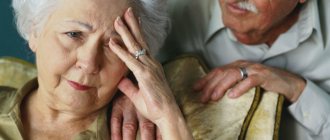Blood pressure is a general indicator of the state of the human cardiovascular system. It cannot be said that the tonometer levels stand still; we are talking about a dynamic value that changes every second.
Blood pressure standards are defined by the World Health Organization as an interval from 100 to 140 per 60-90 units. Minor deviations in one direction or another are possible.
Exceeding the pressure by 10 units in the evening is acceptable and rarely poses a threat to life or health. 20 or more is no longer desirable. A doctor's help is needed.
In most cases, the increase in blood pressure in the dark is due to subjective factors, such as pathological nutritional habits, prolonged stay in one position, abuse of alcoholic beverages or nicotine.
Pathogenic causes associated with the course of certain pathologies of renal, cardiac, endocrine, and neurogenic origin are also possible.
The necessary minimum research program allows you to quickly identify the root cause of increased blood pressure and reduces the risk of dangerous complications for health and life.
Physiological factors for increased blood pressure in the evening
Natural causes not related to disease can be represented by the following list:
- Consumption of caffeine and drinks and medications containing it. The substance has a pronounced tonic effect and provokes a significant increase in blood pressure due to increased tone of large main vessels.
The result is stenosis (narrowing) of the blood supply structures, the development of significant arterial resistance and an increase in tonometer readings.
Dangerous drinks include tea, coffee, and energy drinks (they also contain a lot of sugar, so they can cause diabetes if consumed over a long period of time).
- Smoking. Blood pressure especially often rises in the evening in patients with a decent history of using tobacco products. Both classic cigarettes and cigars and cigarettes are dangerous.
It is not only and not so much nicotine that is to blame for the increase in blood pressure, but rather harmful tars and chemical compounds.
The tonometer indicator can vary within wide limits. The more tobacco a patient used per day, the more significant the increase in blood pressure at night.
The reason is a spasm of blood vessels, a decrease in overall hemodynamics (blood flow through the vessels).
- Excessive consumption of salty foods at lunch or dinner. The increased load on the stomach and digestive tract as a whole affects the cardiovascular system.
Lets you know the need for more intensive blood supply to anatomical structures.
In general, an increase in blood pressure by more than 10 units from normal, even after a large meal, is not normal. This is an indication of a pathological process.
Moreover, you should pay attention to your own health with the parallel development of tachycardia (increased heart rate).
- Meteor dependence. According to statistics, approximately 25% of people in the population suffer from this condition. When atmospheric pressure changes, the tonometer reading increases.
Changes are especially common when there is rainy weather and low atmospheric pressure.
- Alcohol consumption in the morning. Contrary to all the myths about the benefits of alcohol (we are talking about small doses), this is nothing more than a lie on the part of sellers and a misconception of the buyers themselves.
At the first moment, blood pressure actually decreases, the vessels become wider.
In the next period of time, the reverse process occurs with an increase in blood pressure and stenosis (narrowing) of the main blood supply structures. This is extremely dangerous and can lead to a stroke or heart attack.
- Transitional age 12-19 years. Blood pressure can vary widely throughout the day: from 120 to 180 mmHg and even higher.
Puberty is associated with induced secondary hypotension or hypertension of endocrine and neurogenic (mixed) origin.
In this case, you do not need to do anything, except for situations with a persistent increase in tonometer readings.
- Pregnancy. Gestation is accompanied by sharp jumps in blood pressure within significant ranges. In the evening, the pressure rises as a result of being in an upright position for a long time, but after rest everything returns to normal. If this is not the case, you need to consult a cardiologist to select possible therapy.
- Menopause, menstrual cycle. A change in a woman’s hormonal levels affects her. Normalization of pressure is likely after the “storm” subsides. Not counting menopause. It is corrected through replacement therapy.
- Physical and psycho-emotional tension. Causes a sharp jump in blood pressure in the dark due to the prolonged release of cortisol, norepinephrine and adrenaline (hormones of the adrenal cortex).
- Too much use of oral contraceptives of progestogen and estrogen origin.
For physiological reasons, high blood pressure in the evening is the result of fatigue, the influence of climatic, weather factors, and hormonal factors. Treatment is usually not required.
Foods that increase blood pressure
If you have identified a tendency to increase blood pressure in the evening, you need to reconsider your diet in the direction of reducing the amount of foods that are dangerous in this regard:
- Pickles, gastronomic delicacies with high salt content;
- Carbonated sweet drinks;
- Confectionery;
- Tea, coffee, energy drinks;
- Heavy fatty dishes and smoked meats;
- Some seafood (herring, red caviar);
- Spices and hot spices;
- Canned foods;
- Sugar and sweets;
- Butter, cream, sour cream, salted cheeses and other animal fats.
If you are prone to hypertension, the body instantly reacts with high blood pressure parameters to the intake of nutrients from this list, since their breakdown products narrow the blood vessels and clog them with cholesterol deposits, wastes and toxins.
Pathological factors
There are many more pathogenic causes. Among them:
- Hyperthyroidism. Causes a persistent, constant increase in blood pressure, including at night when the patient is sleeping.
The reason is an excess of thyroid hormones in the bloodstream. Possible increased heart rate like tachycardia (more than 90 beats per minute).
- Hypercorticism. Increased amount of cortisol in the patient’s body. Caused by tumors of the adrenal glands, pituitary system (adenomas and others). Cortisol has a pronounced hypertensive (increasing blood pressure) effect, the peak of secretion occurs in the evening and night.
- Diabetes mellitus, especially type 1. It destroys all systems and organs to the core, and without specialized treatment it threatens with severe disabling consequences: gangrene, blindness, bleeding.
- Neurological pathologies. Dysregulation of vascular tone at the central level as a result of dyscirculatory changes, traumatic lesions and other conditions. The process is accompanied by many additional symptoms.
- Diseases of the spinal column, accompanied by weakening of local hemodynamics in cerebral structures.
Special regulatory centers of the brain responsible for increasing or decreasing vascular tone suffer.
Possible diagnoses include: vertebrobasilar insufficiency, osteochondrosis, hernia of the cervical spine, etc.
- Vascular diseases. The record holder is atherosclerosis of the aorta or other large vessels. It is determined by narrowing or blockage of the lumen of the hollow structure, the formation of cholesterol plaques and impaired blood flow. To provide tissues with oxygen and nutrients.
The heart begins to work more actively, pumping out blood with greater force. The systolic (upper) and diastolic (lower) indicators increase.
Over time, petrification (petrification) of sediments occurs. This form can only be treated surgically. It is not worth taking it to a dangerous limit.
- Conditions associated with kidney problems. Pyelonephritis, nephritis, glomerulonephritis, nephropathy, hyperhidrosis, polycystic disease and other pathologies of the nephrogenic profile provoke an increase in blood pressure that occurs in the evening.
- Brain injuries (concussions, hematomas).
The reasons why blood pressure rises in the evening are pathologies of the cardiovascular system, brain, musculoskeletal system, kidneys and excretory structures.
If the pressure rises at night, the reason lies in endocrine factors (diseases of the thyroid, pancreas, adrenal glands).
How dangerous is such a condition?
Depends on the tonometer readings and the intensity of the hypertensive process. The normal range is 100-140 by 80-90 mmHg, and the maximum permissible deviation is 10 units. 20 or more is a reason to contact a cardiologist.
A critical increase in blood pressure is accompanied by levels of 190-200 to 100-120 and higher. Such changes in the evening and at night do not bode well: a stroke, heart attack, interruptions in heart function, even cardiogenic shock are possible.
In the long term, there is a risk of congestive heart failure, coronary artery disease, and nephropathy.
Calling an ambulance will be the best solution to the problem under such conditions.
Measurements are taken every 20 minutes to monitor general condition. After the doctors arrive, you need to report your blood pressure levels.
How to treat the disease?
If an elderly person’s blood pressure fluctuates, then first of all he needs to see a doctor. The specialist will conduct diagnostics to determine the cause of the pathology, individually select medications, adjust the dosage, and take into account the presence of chronic diseases and contraindications.
It is recommended to keep a diary to note after what actions the blood pressure decreased or increased, which will help the doctor prescribe the optimal treatment.
Self-medication is only possible as an emergency, after which you should call a doctor. Otherwise, it can lead to serious complications and death.
What symptoms should you pay close attention to (when to see a doctor)?
Dangerous manifestations are diverse, which signs should be especially wary:
- Intense headache for no apparent reason. Accompanied by a squeezing sensation in the back of the head and parietal region.
- Vertigo. Up to complete loss of orientation in space during acute ischemia of the cerebellum, which is responsible for the vestibular apparatus.
- Vomiting without signs of relief after the process.
- Aching pain behind the sternum, acceleration of the heart rate or, on the contrary, its slowdown.
- Problems with heart rate (lack of a clear pattern of the organ’s beating, randomness in its work).
- Sweating (hyperhidrosis).
- Cognitive impairment (decreased memory, mental activity).
- Facial distortion, inability to control facial muscles.
- “Disobedience” of half the body. Paresis, paralysis.
- Paresthesia, sensation of goosebumps running on the skin.
- Impaired hearing, vision, and smell (focal neurological symptoms).
The appearance of any of these manifestations is grounds for calling an ambulance. Especially if you suspect a stroke or heart attack.
How to identify pathology?
A tonometer will help accurately diagnose changes. But they can also be identified by deterioration in well-being.
Blood pressure surges are accompanied by:
- Headache and dizziness;
- Alternating redness and paleness of the skin;
- Noise in the ears;
- The appearance of black dots before the eyes;
- Nausea and vomiting;
- Numbness of fingers;
- Cold extremities;
- Muscle tremors of the whole body;
- Tremor of the limbs;
- Slowing or increasing heart rate;
- Feeling of lack of air (shortness of breath);
- Aching or girdling pain in the chest area;
- Increased sweating;
- Severe weakness, fatigue and weakness (sometimes a person cannot even walk);
- Fainting and convulsions.
If such symptoms appear, it is necessary to measure blood pressure in both arms and monitor the readings for 2 hours, every 20-30 minutes.
First aid for an attack of hypertension
A significant increase in blood pressure levels requires urgent medical attention. You should call an ambulance. Before the doctors arrive, you will need to take a horizontal position, calm down and not panic. This will only worsen an already serious condition.
Showers, baths and other dubious methods should be left aside. This is harmful advice that can cost the patient’s life.
Before the ambulance arrives, you should take the prescribed drug (if treatment has already been prescribed) or a medicine based on herbal components, phenobarbital (Corvalol, Valocordin, Motherwort and Valerian, but not in the form of an alcohol tincture: ethanol is the enemy of hypertension).
Capoten, Captopril, vasopressors (dopamine) and other medications should not be taken: it is impossible to calculate the dose yourself, so there is a risk of a sharp drop in blood pressure with the development of a heart attack or stroke.
Upon arrival of the team, the issue of possible transportation to a hospital is decided. Whether to go or not is up to the patient himself. But there is no point in refusing: it is not known what we are talking about. It is better to understand and establish the root cause.
High blood pressure medications
Hypertension must be treated in combination:
- Diet;
- Phytotherapy;
- Medicines;
- Sanatorium-resort events.
A balanced diet plays a special role in restoring normal blood pressure. When adjusting the menu, hypertensive patients need to pay special attention to “harmful” foods:
- Fat meat;
- Canned foods;
- Semi-finished products;
- Quick snacks (fast food);
- Caffeinated drinks;
- Alcohol.
Neglect of these restrictions often leads to a hypertensive crisis. In the first stages of hypertension, medicinal herbs help well. To combat high blood pressure, traditional medicine offers infusions of the following plants:
- Rosehip;
- Aloe;
- Calendula;
- Hawthorn;
- Viburnum;
- Lingonberries;
- Raspberry leaves;
- Motherwort.
All plant materials (except aloe) are processed in the form of tinctures and decoctions. You can use them for monotherapy or prepare preparations. Juice is obtained from aloe, which should be drunk 3-4 drops for 30 days.
What examinations will be required?
Cardiologists manage patients with arterial hypertension, especially in the evening. At the discretion of the specialist, a nephrologist, neurologist, and endocrinologist are involved.
List of possible studies:
- Examination of the patient, assessment of complaints. Objectification of symptoms for further analysis and comparison of factors.
- Collecting anamnesis (personal and family). Possible heredity, the presence of bad habits.
- Measuring blood pressure using a tonometer. On two hands.
- Study of daily blood pressure dynamics. A Holter monitor is used, which is installed for 24 hours and first programmed. Measurements are taken every 20-40 minutes and the results are recorded in the device’s memory.
- Echocardiography. Ultrasound technique. Hypertension produces characteristic changes in the heart (myocardial thickening, left ventricular hypertrophy).
- General blood test, biochemical test, urine test.
- Assessment of hormonal levels, neurological, nephrological status using special techniques.
A comprehensive examination is the key to a quick diagnosis.
Therapeutic measures
Specific therapy, using drugs of several groups:
- Beta blockers.
- Calcium channel blockers.
- Diuretics.
- ACE inhibitors.
- Vitamin and mineral complexes.
- Food supplements with microelements.
Statins are used to eliminate lipid deposits.
Tonics are not used as they are dangerous and ineffective in the fight against high blood pressure.
Herbal sedatives based on motherwort and valerian, and barbiturates in small dosages are prescribed.
If necessary, surgery is indicated (heart defects, vascular defects, development of malformations, benign and malignant tumors in anatomical structures, aneurysms, cholesterol plaques).
Given the physiological nature of the condition, a change in schedule and lifestyle is indicated. You need to sleep at least 8 hours, avoid exercise, smoking, alcohol, especially psychoactive substances, use drugs in a strictly designated dosage after consultation with a specialized specialist.
Systematicity and complexity are important in treatment.
Treatment methods
In cases where arterial hypertension bothers the patient every evening, it is necessary to contact the attending physician to determine the cause of the condition, depending on which a treatment regimen will be selected. Drug therapy should be complex and include taking several drugs, such as diuretics, ACE inhibitors, calcium channel antagonists. Additionally, the use of vitamin complexes is prescribed to restore hemodynamic parameters.
If the numbers increase unsystematically, non-drug medications are used to lower blood pressure:
- Self-massage. Helps to relax the neck muscles and eliminate headaches when indicators increase.
- Physiotherapy. Allows you to strengthen the cardiovascular system and increase the elasticity of the arteries.
- Phytotherapy. Involves taking antihypertensive drugs from medicinal plants. Drops of valerian, motherwort, and hawthorn stabilize well in case of nervousness.
To maintain the normal state of the vascular system, patients are recommended to follow a diet aimed at reducing the amount of salt, fats, and carbohydrates in the daily diet.
If blood levels regularly increase in the evening, you should undergo a cardiological, neurological, nephrological examination to determine the true cause of the condition. An evening increase can signal the initial stage of hypertension, so with timely treatment, the progression of the disease can be slowed down.

